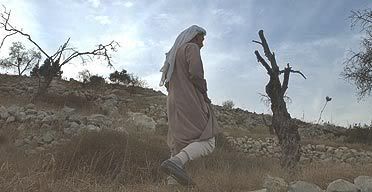This interesting article from the British site, Jews sans frontiers, states that Jews and Muslims can be friends. So they can. But is `Peace Oil’ (olive oil) really an expression of that friendship? Critics say that Peace Oil is infringing upon and competing with the international sale of Palestinian olive oil, which is a big part of the already faltering Palestinian economy.
The article is about British support for Palestinians, but it also applies to the United States. Most of the article, which is taken from Mark Tran at the Guardian, argues that these “Jews and Muslims can be friends” type projects can undermine the Palestinians (Saturday, December 08, 2007).
Peace Oil, an olive oil made in Israel by Jews and Arabs, would seem an ideal Christmas gift for those wishing to take a stand against consumerism. The oil is one of the products promoted in the Good Gifts catalogue, run by the Charities Advisory Trust (Cat), an organisation founded by Hilary Blume and widely respected for advising charities on ethical ways of generating funds.
The blurb on the Peace Oil website claims the product encourages cooperation between communities. By helping to market the olive oil, Cat hopes to bring economic prosperity to such enterprises, thereby encouraging others. Profits from Peace Oil® are used to support peace and reconciliation work in the Middle East.
Despite its laudable intentions, however, Cat has come under fire from those who claim it is undermining products made by Palestinians and brought into Britain by cooperatives such as Zaytoun (Arabic for olives).
The Palestine Solidarity Campaign, Jews for Justice for Palestinians, the UK branch of the Israeli Committee Against House Demolitions and the Inter-Faith Group for Morally Responsible Investment, have written to church and charity groups urging them to promote Palestinian olive oil rather than Peace Oil.
Olive oil, the backbone of the Palestinian Authority’s agricultural economy, is a vital source of income for tens of thousands of farmers and their families, 67% of whom live below the poverty line.
(snip)
“It’s a total con,” the activitist said. “Peace Oil is using peace to obfuscate the lack of justice for Palestinians in the conflict. It is misleading people of goodwill who want to do something for peace.”

(A Palestinian passes some of the 1,000 olive trees burned or cut down by militant Jewish settlers at Einabus, on the West Bank, in 2003. This picture has been repeated many times in the West Bank and was a key tool in the continuing ethnic cleansing of Palestinians.)
According to Jews sans frontiers, this isn’t the first time the charity sector has been used to support Israel at the expense of the Palestinians. Many of the charities operating in the West Bank and Gaza, it is said, are getting Israel off the hook of its responsibilities as an occupying power.
A bit harsh but the question remains: what to buy? Obviously the peace activists win out on this one, in spite of the good intentions of Peace Oil.
Zaytoun (link above), a British importer of Palestinian oil, describes the advantages of buying `fair traded’ Palestinian oil as follows:
Zaytoun is an ethical business to import olive oil from Palestinian farmers at Fair-Trade prices. Zaytoun invests 100% of its taxable profits to help create a sustainable future for Palestinian farmers. Their olive oil comes from some of the oldest olive groves in the world – with some olive trees dating as far back as 1500 to 2000 years.
The Israeli occupation has devastated the Palestinian economy, including the olive oil dominated agricultural sector, which supports over 65% of the Palestinian people. Over half the olive oil produced in Palestine is thrown away due to a lack of access to international markets. Even so, Palestinians continue to harvest their crops, as otherwise, under Israeli law, unfarmed land is confiscated by the state. Since the start of the second Intifada, the proportion of Palestinians living below the UN poverty level has reached almost 75%.”
Zaytoun oil is grown and harvested free of pesticides using traditional farming methods. The process is underway to have the olive oil officially certified as organic & Fair-Trade.
More information about fair traded Palestinian oil is available at these sites: Canaan Fair Trade, The Palestinian Agricultural Relief Committees, The Palestinian Olive Tree Association, Union of Agricultural Work Committee, Sindyanna, and Project Hope.
A diary about Palestinian oil was also posted on Daily Kos recently.
The above controversy is British in origin. Where can we buy Palestinian olive oil here in the USA? Here are some sourcesl: Zatoun-USA (online), Palestine Online Store (online), and Holy Land Olive Oil (store outlets listed below).
Please note that none of stores supplied by Holy Land will ship – purchase is in-store only.
·Berkeley Global Exchange Fair Trade Store, 2840 College Ave, Berkeley
·Buffalo Mountain Food Co-op 30 N. Main Street Hardwick, VT 802.472.6020
·Potter’s House, 1658 Columbia Road, NW – Washington, DC
·Razan’s Organic Kitchen: 2119 Kittredge, Berkeley – 510.486.0449
·Rainbow Grocery, 1745 Folsom Street, San Francisco
·The Heartland Cafe 7000 N. Glenwood Ave, Chicago – 773-465-8005
·White Dog Cafe / Black Cat Gift Shop, 3420 Sansom Street, Philadelphia
Finally, the Michigan Peace Team, which is associated with the International Solidarity Movement based in the West Bank, is also a source for the purchase of Palestinian olive oil. I’m certain there are others.
A great gift in these times of humanitarian need.






